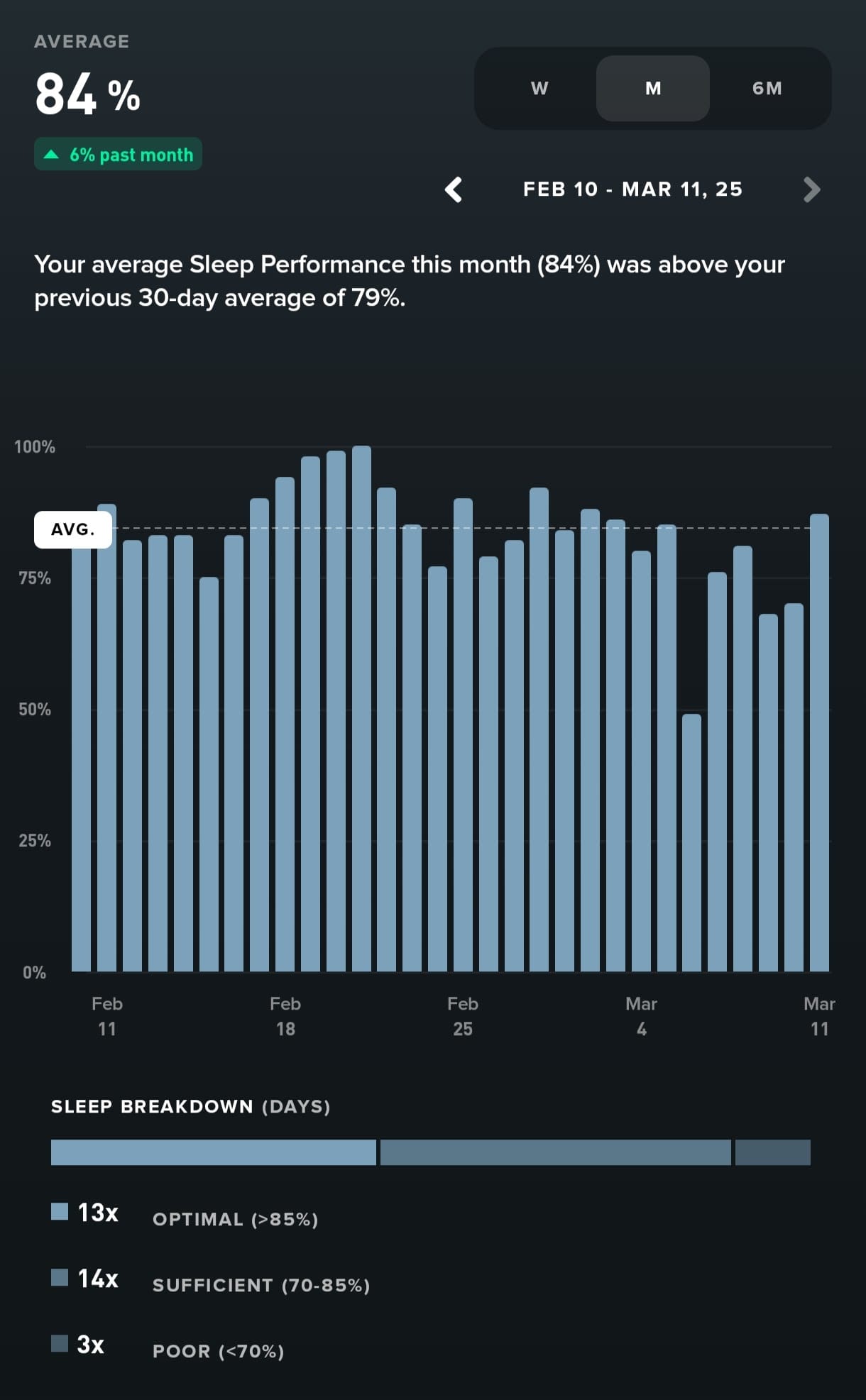I Tried Different Things to Improve My Sleep Over 30 Days – What Worked?
I optimized my sleep for 30 days using simple, sustainable habits - no gimmicks, just real changes. Here's what worked, what didn’t, and how it improved my energy, focus, and recovery.

Sleep is probably one of the most important things we do each day. That might sound like an overstatement, but think about it - how you sleep affects your energy, mood, productivity, and even recovery for the next day (or week). So, is it really that hard to believe?
After watching a Bryan Johnson video titled How I FIXED My Terrible Sleep – 10 Habits, I started wondering: How much could I optimize my sleep in a way that’s actually sustainable after 30 days?
I’ve never really struggled to fall asleep, but over the last month or so, I let bad sleep habits creep back in. This led to more wake events throughout the night and a general feeling of grogginess in the morning. On top of that, my inconsistent sleep schedule wasn’t doing me any favors.
So, I decided to test different sleep optimization strategies over 30 days and tracked the results using my Whoop 4.0 band.
Disclaimer: Some of the links on this page are affiliate links. I will receive a commission if you purchase something through these links.
The Experiment: 30 Days of Sleep Optimization
Baseline: How I Was Sleeping Before
To get a clear picture of where I stood, I analyzed my Whoop sleep performance data from the 30 days before starting this experiment. My average sleep performance was 84%, which wasn’t terrible - but the real problem was the 79% sleep performance from the 30 days before that, during which I was recovering from a back injury.

Subjectively, my sleep didn’t feel awful. Sure, I had groggy mornings, but I didn’t think I was severely underperforming due to poor sleep quality. Turns out, I was way off.
The Strategies I Tried
1. Adjusting My Nighttime Routine
A consistent wind-down routine makes a massive difference in sleep quality. Here’s what I stuck to:
- Hot shower before bed using my favorite Rituals Jing shower gel, infused with lavender essential oils for relaxation.
- Skincare routine to help me unwind and signal to my brain that it’s time to rest. This consisted of a cleanser, a powered clenser, and an anti-aging moisturising night cream. This one by Rituals, to be precise.
- Reading for 30 minutes in bed - no screens or TV for at least an hour before sleep.
- Bluelight filter on all devices.
2. Tweaking My Diet & Supplements
What (and when) you eat affects sleep more than you’d think. While I wasn’t about to cut off food at midday (I’ve got protein targets to hit), I made a few strategic changes:
- Last meal no later than 7:30 PM, allowing a 3-hour digestion window before bed. No snacking after this.
- 500mg Magnesium supplement taken 60 minutes before bed.
- Shifting heavy meals to post-workout in the afternoon. Evenings were kept light, avoiding red meat and focusing on lean proteins like chicken or fish, paired with complex carbs.
3. Environmental Changes
The ideal sleep temperature is between 15.6°C and 19.4°C (60-67°F), but there’s more to creating a sleep-friendly environment:
- Sleeping with the window open and using a fan for airflow when needed.
- Wearing a MyHalos sleep mask - it’s super comfortable, padded around the eyes and nose, and blocks out all light.
- Using an anti-snore device - originally, I got this for my partner, but the Airmax Nasal Dilator turned out to improve my own sleep by keeping my nasal passages open.
4. Experimenting with Sleep Timing & Tracking
Does a consistent sleep schedule really matter? I tested this by:
- Starting my bedtime routine at 9:30 PM with a hot shower.
- Finishing my nighttime routine by 10:00 PM and read in bed for 30 minutes.
- Lights out at 10:30 PM sharp.
- Tracking everything with my Whoop 4.0 band to monitor sleep performance, recovery, and wake events.
Results: What Actually Worked?
So, after 30 days of optimizing my sleep, what made the biggest impact?
The most effective changes
- Sticking to a consistent sleep schedule made the biggest difference in reducing wake events and improving sleep efficiency.
- No screens before bed & reading significantly improved how fast I fell asleep and how rested I felt in the morning.
- Keeping the room cool and using a sleep mask made a huge difference in sleep quality.
- Avoiding any alcohol, any alcohol consumed during the day decreased my sleep performance by upto 50%!
- Airmax Nasal Dilator did not do much for my snoring, but it did keep my nasal passage more open, allowing me to sleep better.
What didn’t help much?
- Avoiding red meat in the evening had minimal impact - it’s probably more about meal timing than the food itself.
- Magnesium supplementation didn't seem to have any impact whatsoever. It's no melatonin, that's for sure at least not for me.
Final Thoughts & Takeaways
At the end of the day (literally) this whole experiment just reinforced what I think I already knew but had been too lazy to consistently apply: good sleep doesn’t happen by accident.

It’s the result of small, deliberate habits stacked together. I’m not saying you need to turn your evenings into a spa retreat or become some biohacking monk, but a bit of structure and a consistent routine goes a long way.
The biggest takeaway for me? Consistency beats fancy gadgets or supplements every time. Sleep hygiene isn’t sexy, but neither is waking up groggy and cranky. So if you’re feeling off lately, start with your sleep. It might not fix everything, but it’s a hell of a place to start.
